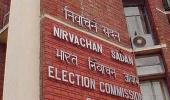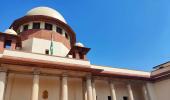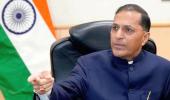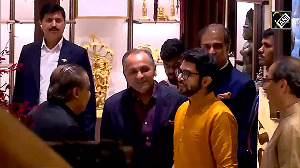The Supreme Court on Thursday said the Election Commission (EC) is duty bound to act in a fair and legal manner and a person who is weak-kneed before the powers cannot be appointed as an election commissioner.

The court said while there may be officers who assist the EC, vitally important decisions have to be taken by those at the helm of the affairs and "it is the chief election commissioner and the election commissioners at whose table the buck must stop".
A five-judge Constitution bench headed by Justice KM Joseph said these observations have a direct connection with the question with which it is concerned with, namely, the need to take the appointments of the members of the EC out of the exclusive hands of the executive, that is, the political party which not unnaturally has an interest in perpetuating itself in power.
The bench, also comprising justices Ajay Rastogi, Aniruddha Bose, Hrishikesh Roy and CT Ravikumar, ruled that the appointments of the chief election commissioner (CEC) and election commissioners will be made by the President on the recommendation of a committee comprising the prime minister, the leader of the opposition in the Lok Sabha and the Chief Justice of India to maintain the "purity of elections".
The bench said, "Undoubtedly, the Election Commission is duty bound to act in a fair and legal manner. It must observe the provisions of the Constitution and abide by the directions of the court. The same being done, it can draw upon a nearly infinite reservoir of power. Once a poll is notified, which again is a call to be taken by the Election Commission itself and indeed capable of being misused and the subject of considerable controversy, if bias or subservience to the powers that be is betrayed, it assumes unusual powers."
The bench, which dealt with the independence of the EC, said the competence of a man is not to be conflated with fierce independence.
"A person who is weak-kneed before the powers that be cannot be appointed as an election commissioner. A person who is in a state of obligation or feels indebted to the one who appointed him fails the nation and can have no place in the conduct of elections, forming the very foundation of the democracy.
"An independent person cannot be biased. Holding the scales evenly, even in the stormiest of times, not being servile to the powerful but coming to the rescue of the weak and the wronged, who are otherwise in the right, would qualify as true independence," it said.
The top court said it therefore finds that the EC has been charged with the duty and blessed with extraordinary powers to hold elections to both Parliament and state legislatures from time to time.
"This is an enormous task. The power it possesses under Article 324 (of the Constitution) is plenary. It is only subject to any law which may be made by Parliament or by a state legislature," it said.
Justice Joseph, who authored the verdict for four judges barring Justice Rastogi, who gave separate reasons despite concurring, said the poll panel's writ lies across governments over the length and breadth of the country.
"Officers of the government who come under its charge become subject to the superintendence of the commission. The fate of the political parties and its candidates and therefore, of democracy itself to a great measure is allowed to rest in the hands of the Election Commission. While there may be officers who assist the commission, vitally important decisions have to be taken by those at the helm of the affairs. It is the chief election commissioner and the election commissioners at whose table the buck must stop," the bench said.
The court said a person may be excellent at his chosen vocation, an excellent administrator and honest, but the quality of independence transcends the contours of the qualities of professional excellence, as also the dictates of honesty.
"We may, no doubt, clarify that ordinarily, honesty would embrace the quality of courage of conviction, flowing from the perception of what is right and what is wrong. Irrespective of consequences to the individual, an honest person would, ordinarily, unrelentingly take on the high and mighty and persevere in the righteous path," Justice Joseph said.
He said an election commissioner is answerable to the country and people look forward to him so that democracy is always preserved and fostered.
"We may qualify the above observations by stating that true independence of a body of persons is not to be confused with sheer unilateralism. This means that the Election Commission must act within the constitutional framework and the laws. It cannot transgress the mandate of either and still claim to be independent. Riding on the horse of independence, it cannot act in an unfair manner either. Independence must be related, finally, to the question of what is right and what is wrong," the bench said.
It added that upholding the constitutional values, which are in fact a part of the Constitution's basic structure and which includes democracy, the rule of law, the right to equality, secularism and the purity of elections, would indeed proclaim the presence of independence.
"Independence must embrace the ability to be firm, even as against the highest. Not unnaturally, uncompromising fearlessness will mark an independent person from those who put all they hold dear before their karma," it said.
The bench emphasised that it is important that appointments in the EC must not be overshadowed by even a perception that a "yes man" will decide the fate of democracy and all that it promises.
"Certainty, the darkest apprehensions of the founding fathers (of the Constitution) as buttressed by the reports and other materials unerringly point to the imperative need to act," it said.
The top court said the founding fathers of the Constitution had intended that elections in the country must be held under the superintendence, direction and control of an independent body.










